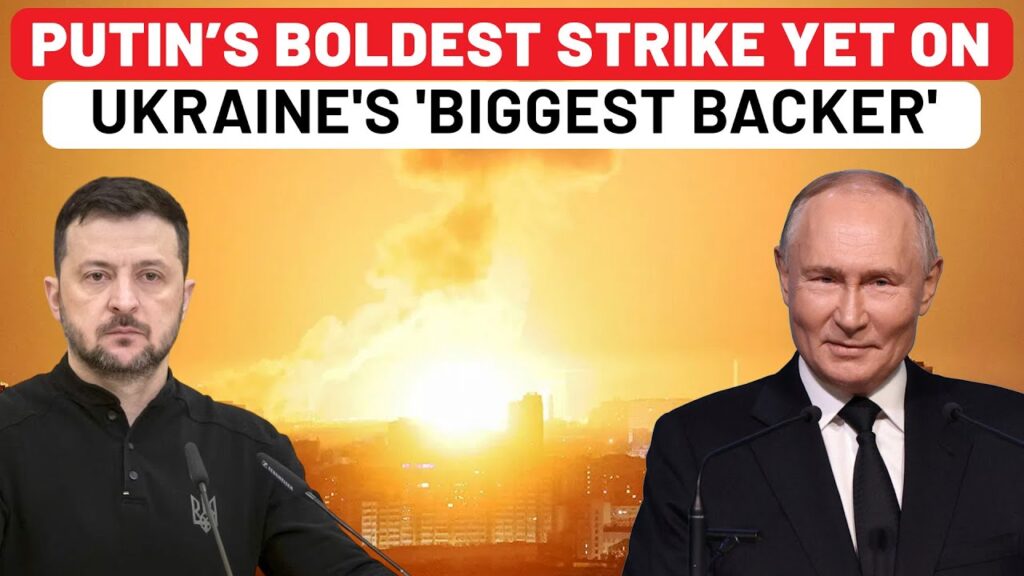Russia has officially ended its decades-long defence pact with Germany, calling Berlin “dangerous again.” Moscow accuses Germany of aggressive militarism and direct involvement in Ukraine, branding it now as Russia’s top enemy replacing the U.S. in recent public polls. As military budgets soar and diplomacy falters, is this the start of a new Cold War in Europe? INTERNATIONAL NEWS #Russia #Germany #Putin #ColdWar #UkraineWar #NATOTensions #DefensePact #Lavrov #Berlin #Peskov #Geopolitics

Moscow Brutally Targets Zelensky’s Main Backer, Shreds Germany’s Defense Pact With Unexpected Strike
In a move that stunned the Western alliance, Moscow launched a sudden and devastating strike targeting Germany — widely seen as one of Ukrainian President Volodymyr Zelensky’s most influential backers. The strike, which experts are calling both symbolic and strategic, has upended Germany’s security assumptions and put NATO on alert, shaking the fragile cohesion of Europe’s defense commitments to Ukraine.
The attack came in the form of a high-intensity cyber and drone operation directed at German military logistics and infrastructure. Though no casualties were reported, several key military supply routes and communication systems in eastern Germany were paralyzed for hours. German officials, speaking anonymously, admitted that their defense pact with Ukraine has taken a serious blow — not in spirit, but in operational confidence.
Moscow has not officially claimed responsibility, but Russian state media wasted no time framing the incident as a “necessary reminder” to Berlin and other NATO capitals. Kremlin spokesperson Dmitry Peskov denied direct involvement while issuing a thinly veiled warning: “When nations sponsor war at our borders, they should not expect immunity.”
Germany, under Chancellor Olaf Scholz, has been a consistent supporter of Ukraine since Russia’s 2022 invasion, providing tanks, advanced air defense systems, and financial aid. This latest strike seems designed to rattle that support. It was calculated — avoiding direct fatalities but hitting Germany’s military nerves at a time when Berlin was preparing to ramp up weapons shipments to Kyiv.
Analysts say the timing is no coincidence. Germany recently approved a €10 billion increase in military assistance to Ukraine over the next year, drawing Putin’s ire. The Russian president has long viewed German military resurgence with suspicion, especially given Germany’s role in the European Union’s economic and sanctions pressure on Moscow.
Meanwhile, in Ukraine, President Zelensky condemned the strike as “cowardly hybrid aggression” and praised Berlin’s continued partnership. But privately, some Ukrainian officials fear this may mark the beginning of a broader campaign by Russia to intimidate Ukraine’s Western backers one by one.
Within Germany, the strike has ignited political tension. Opposition parties are demanding an investigation into how Russia could so easily penetrate German systems. Critics argue that Scholz’s government underestimated the cyber and drone threat from Moscow. Others, particularly from the far-right AfD party, are using the moment to call for an end to weapons support for Ukraine, arguing that Germany is being “dragged into a war that is not ours.”
NATO officials have been quick to downplay the incident’s strategic impact while acknowledging the seriousness of the attack. Secretary-General Jens Stoltenberg called it “unacceptable and dangerous” and warned Moscow against testing the alliance’s resolve.
Despite the chaos, most observers believe the attack will only strengthen the alliance between Berlin and Kyiv. Germany’s defense ministry has vowed to accelerate support for Ukraine and bolster its own cyber and drone defenses.
Still, the psychological effect lingers. Moscow’s unexpected strike was not about territory — it was about shaking Europe’s confidence and exposing weaknesses. In doing so, the Kremlin has opened a new front: a war of nerves and perception aimed at isolating Ukraine by intimidating its partners.
And for now, that front appears wide open.
